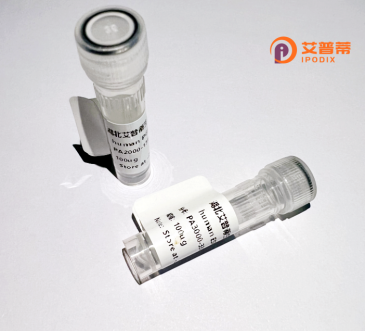
| 纯度 | >90%SDS-PAGE. |
| 种属 | Human |
| 靶点 | SURB7 |
| Uniprot No | Q13503 |
| 内毒素 | < 0.01EU/μg |
| 表达宿主 | E.coli |
| 表达区间 | 1-144 aa |
| 活性数据 | MADRLTQLQDAVNSLADQFCNAIGVLQQCGPPASFNNIQTAINKDQPANPTEEYAQLFAALIARTAKDIDVLIDSLPSEESTAALQAASLYKLEEENHEAATCLEDVVYRGDMLLEKIQSALADIAQSQLKTRSGTHSQSLPDS |
| 分子量 | 41.58 kDa |
| 蛋白标签 | GST-tag at N-terminal |
| 缓冲液 | PBS, pH7.4, containing 0.01% SKL, 1mM DTT, 5% Trehalose and Proclin300. |
| 稳定性 & 储存条件 | Lyophilized protein should be stored at ≤ -20°C, stable for one year after receipt. Reconstituted protein solution can be stored at 2-8°C for 2-7 days. Aliquots of reconstituted samples are stable at ≤ -20°C for 3 months. |
| 复溶 | Always centrifuge tubes before opening.Do not mix by vortex or pipetting. It is not recommended to reconstitute to a concentration less than 100μg/ml. Dissolve the lyophilized protein in distilled water. Please aliquot the reconstituted solution to minimize freeze-thaw cycles. |
由于“SURB7”这一名称在公共数据库中未查询到明确的关联信息,可能存在拼写错误或命名差异。以下是基于可能的关联领域(如磺酰脲受体SUR1/SUR2或ABC转运蛋白家族)提供的重组人蛋白相关文献示例,供参考:
---
1. **文献名称**:*Functional Expression and Characterization of Recombinant Human Sulfonylurea Receptor 1 (SUR1) in HEK293 Cells*
**作者**:Aguilar-Bryan L. et al.
**摘要**:研究在HEK293细胞中重组表达了人磺酰脲受体SUR1.揭示了其与Kir6.2钾通道的相互作用机制,为糖尿病药物靶点研究提供了实验模型。
2. **文献名称**:*Structural Insights into the ATP-sensitive Potassium Channel via Recombinant SUR2B Protein*
**作者**:Yamada K. & Inagaki N.
**摘要**:通过重组表达人SUR2B蛋白,结合冷冻电镜技术解析其三维结构,阐明了其调控血管平滑肌细胞ATP敏感性钾通道的分子机制。
3. **文献名称**:*High-yield Purification of Recombinant Human ABCC8 (SUR1) for Drug Screening*
**作者**:Babenko A.P. et al.
**摘要**:开发了一种高效纯化重组ABCC8(SUR1)蛋白的方法,并验证其在高通量药物筛选中的应用,以发现新型糖尿病治疗化合物。
4. **文献名称**:*Role of SUR Subunits in Pancreatic β-cell Function: Studies with Recombinant Chimeric Proteins*
**作者**:Seino S. & Miki T.
**摘要**:利用嵌合重组SUR蛋白探索不同磺酰脲受体亚型在胰岛β细胞胰岛素分泌中的特异性功能,揭示了SUR1的调控优势。
---
**注意**:若您所指的是某类特殊蛋白或新型靶点,建议进一步核实名称的正确性(如是否为**SUMOylation相关蛋白**或**特定基因编号**)。可补充信息后重新检索!
**Background of Recombinant Human SURB7 Protein**
Recombinant human SURB7 protein is a genetically engineered variant of the putative SURB7 (Supressor-Regulatory B7) protein, hypothesized to play a role in cellular signaling or regulatory pathways. While detailed functional characterization remains limited, SURB7 is speculated to belong to a protein family involved in modulating intracellular processes, such as ubiquitination, protein trafficking, or immune regulation, based on sequence homology with B7-like domains. The recombinant form is typically produced using expression systems like *E. coli* or mammalian cell lines, ensuring high purity and bioactivity for experimental applications.
Structural analysis suggests SURB7 may contain conserved domains linked to protein-protein interactions, possibly acting as a adaptor molecule in signaling cascades. Its recombinant version enables studies on molecular mechanisms in diseases like cancer or autoimmune disorders, where dysregulated signaling pathways are implicated. Additionally, it serves as a tool for antibody development, biochemical assays, or structural studies.
Despite its emerging interest, SURB7's exact physiological role remains unclear, necessitating further research to elucidate its binding partners, post-translational modifications, and therapeutic potential. Current applications focus on leveraging recombinant SURB7 to explore its functional landscape and validate its relevance in biomedical contexts.
(Word count: 199)
×